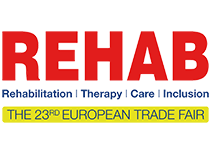BARMER withdraws revision: Facilitated care with Rewalk exoskeletons for paraplegics in the future
Paraplegics in Germany can expect easier care with a Rewalk exoskeleton in the future. Because Barmer has withdrawn its appeal, the decision of the NRW State Social Court is legally binding.
REHAB, trade fair for rehabilitation, therapy, care and inclusion will take place in the Karlsruhe exhibition halls from June 15 to 17, 2023. Rewalk Robotics will also be there. The company manufactures exoskeletons - and will become even more important for people with spinal cord injury in the future.
The reason for this is the withdrawal of the appeal by the Barmer insurance company against the judgement of the second instance of the State Social Court of North Rhine-Westphalia. A 32-year-old man, who is insured with Barmer and had applied there for the supply of a Rewalk Personal 6.0 exoskeleton, was at the center of the legal dispute.

The withdrawal of the appeal shortly before the deadline at the Federal Social Court means that the judgement of the State Social Court of North Rhine-Westphalia is now legally binding. As a result, paraplegics in Germany can now expect easier access to a Rewalk exoskeleton.
An exoskeleton can enable paraplegics to stand upright, walk and even climb stairs. In its judgement, the State Social Court of North Rhine-Westphalia pointed out that insurance companies may not reject applications for orthopaedic aids such as the Rewalk exoskeleton on the grounds that insured persons have already received care with aids that also serve to indirectly compensate for disabilities.
"The German healthcare system is a pioneer in establishing high standards for the care of people with spinal cord injury," says Larry Jasinsky, CEO of Rewalk Robotics. "Following the achievement of the exoskeleton as a recognized aid in the list of medical aids in 2018, the recognition that exoskeletons serve to directly compensate for disabilities is now only logical. As a service provider, we very much appreciate the fact that health insurance companies commission us to provide their policyholders with exoskeletons. Rewalk Robotics will continue to meet the highest quality standards in the provision of Rewalk exoskeletons."

Plaintiff Lars Vinken can finally use his Rewalk exoskeleton after many years of waiting and legal battles: "The fact that other paraplegics will now have easier access to this technology is of enormous value. Being supplied with an exoskeleton and being able to get up and walk again at any time opens up new horizons for me," he says.
On June 11, 2018, the Rewalk Personal 6.0 was the first exoskeleton for spinal cord injury patients to be listed by the GKV-Spitzenverband in the list of medical aids. This means that the system is officially recognized and reimbursable in Germany as an aid according to paragraph 33 SGB V with the aid number 23.29.01.2001. The corresponding indication is: bilateral paralysis of the hip, thigh and lower leg muscles.

